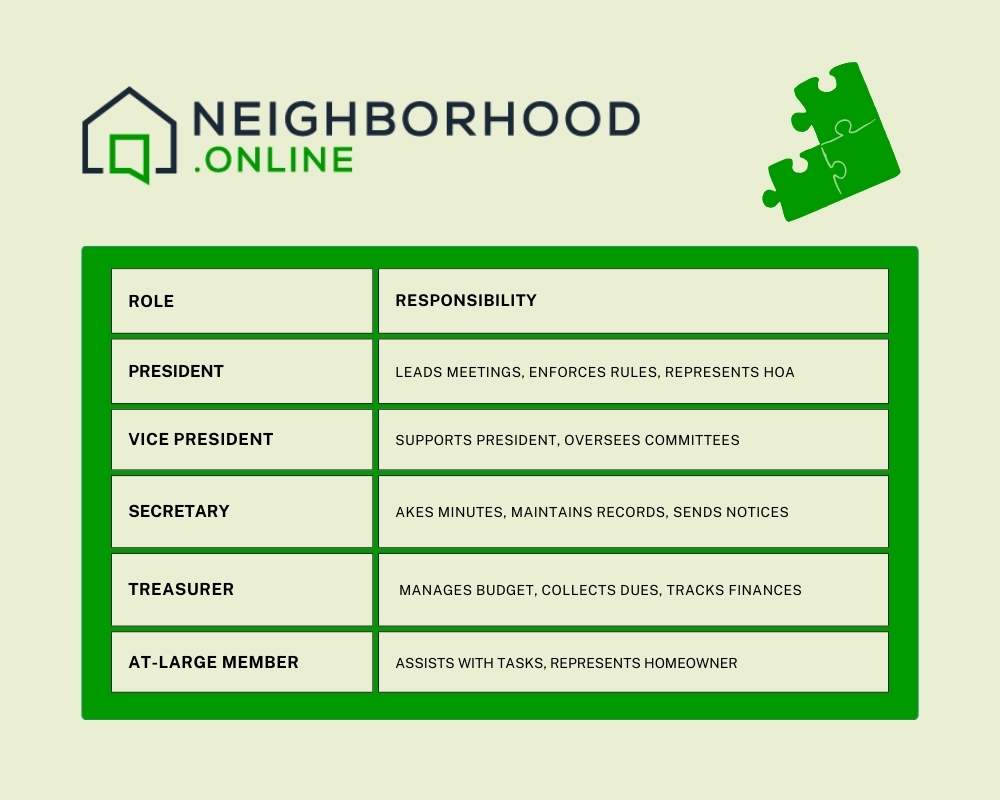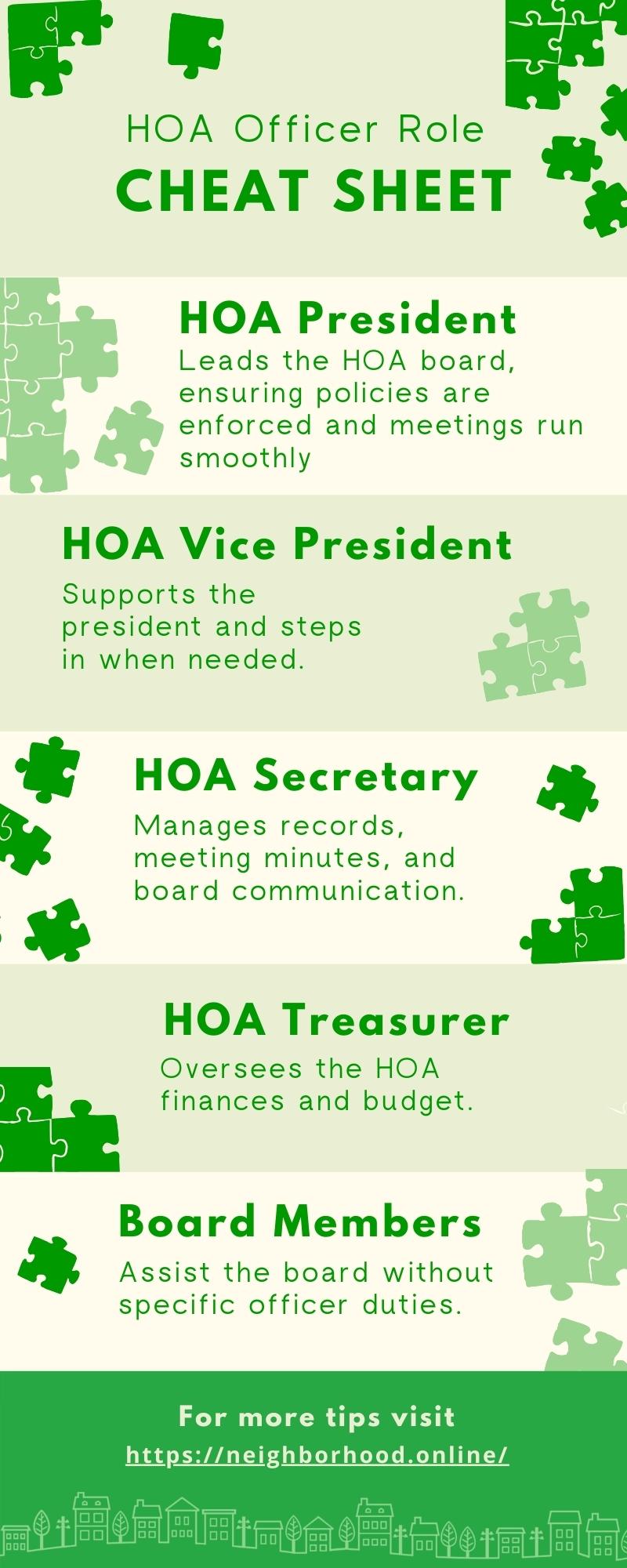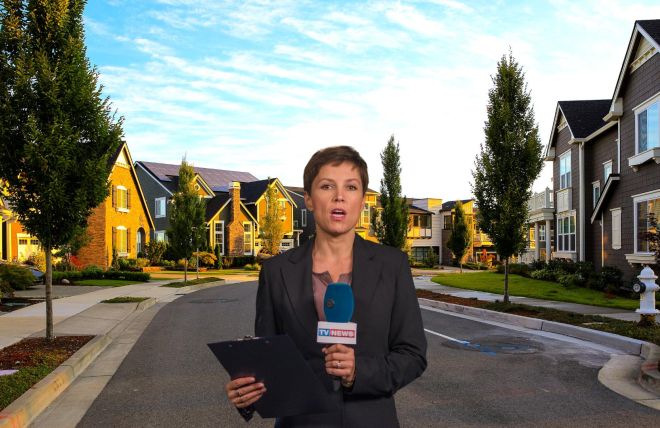Homeowners Associations (HOAs) play a crucial role in maintaining community standards, enforcing rules, and ensuring that common areas and shared resources are managed effectively. However, many homeowners and even board members themselves may not fully understand the responsibilities and leadership roles within an HOA board.
This guide will break down the key responsibilities, duties, and leadership roles within an HOA board, ensuring that current and prospective board members have a clear understanding of how their contributions fit into the bigger picture of community governance.
369,000
Number of Community Associations
12.9
Value of Homes in Community Associations in Trillions of Dollars
33.6%
U.S. Housing in Community Associations
Understanding the HOA Board
An HOA board is a governing body responsible for overseeing the management and administration of a homeowners association. The board is typically made up of elected homeowners who volunteer their time to ensure the community operates smoothly.
Who Serves on the HOA Board?
- Elected Homeowners – Residents who volunteer and are voted in by other homeowners.
- Volunteers – Sometimes, homeowners may assist the board without holding an official position.
- Professionals (If Applicable) – Larger HOAs may hire community association managers or legal advisors to assist the board in operations.
How the HOA Board Functions in a Community Association
- The board sets and enforces community rules based on governing documents such as CC&Rs (Covenants, Conditions, and Restrictions).
- They manage the association’s finances, including collecting dues and budgeting for maintenance.
- They ensure common areas and amenities are properly maintained.
- They hold meetings to discuss issues, approve budgets, and make decisions in the community’s best interest.
Why Does an HOA Board Matter?
An effective HOA board ensures that the community remains well-organized, financially stable, and compliant with regulations.
Role in Enforcing Community Rules (CC&Rs & Bylaws)
- Ensures homeowners follow established guidelines for property maintenance, noise levels, and other community standards.
- Implements fair and consistent rule enforcement to prevent disputes.
- Updates and revises rules as needed to reflect changing community needs.
Importance in Financial Management and Budgeting
- Creates and oversees the annual budget to allocate funds for maintenance, improvements, and reserves.
- Collects HOA dues and assessments to cover operational costs.
- Manages reserve funds for unexpected expenses or long-term projects.
Impact on Property Values and Homeowner Satisfaction
- A well-managed HOA helps maintain property values by ensuring neighborhood aesthetics and upkeep.
- Enforces consistent community standards, preventing unkempt properties from affecting home values.
- Encourages a sense of community, leading to higher homeowner satisfaction and engagement.
Governance and Rule Enforcement
The HOA board is responsible for ensuring that homeowners adhere to the Covenants, Conditions, and Restrictions (CC&Rs) and community guidelines. These rules help maintain the neighborhood’s appearance, safety, and harmony.
Key responsibilities include:
- Enforcing community policies and handling violations consistently.
- Issuing warnings, fines, or other corrective measures for non-compliance.
- Reviewing and updating rules and regulations as needed.
- Ensuring fair enforcement to prevent conflicts and legal issues.
Financial Management & Budgeting
Managing the HOA’s finances is critical for the long-term stability of the community. The board must carefully plan budgets, collect dues, and allocate funds effectively.
Key financial duties include:
- Creating and managing the annual budget to cover operating costs, maintenance, and reserves.
- Collecting homeowner assessments and handling delinquencies.
- Managing reserve funds to cover unexpected repairs and long-term improvements.
- Ensuring financial transparency by providing regular financial reports to homeowners.
Property Maintenance & Vendor Management
Maintaining common areas and shared facilities ensures that the community remains clean, safe, and appealing...
Maintaining common areas and shared facilities ensures that the community remains clean, safe, and appealing to residents. The board oversees maintenance projects and contracts with service providers to handle necessary repairs.
Key responsibilities:
- Overseeing landscaping, security, and facility maintenance.
- Hiring and managing vendors and contractors for community upkeep.
- Ensuring compliance with local and state laws regarding property maintenance.
- Planning for long-term maintenance and capital improvements to avoid major repair costs.
Free Download HOA Management Company Screening Checklist
Are you part of a Homeowners Association looking to streamline your management processes? We've got just the tool for you! Download our comprehensive HOA Management Company Screening Checklist and take the first step towards more efficient, effective, and organized community management.
HOA Board Meetings & Decision-Making
HOA board meetings serve as the platform for discussing community issues, approving budgets, and making key decisions. These meetings must be well-structured and transparent to ensure homeowner involvement.
Responsibilities include:
- Planning and conducting meetings with a clear agenda.
- Keeping detailed meeting minutes for legal and historical records.
- Ensuring transparency and homeowner participation in discussions.
- Following voting procedures for decision-making on policies and expenditures.
Legal & Fiduciary Duties
Board members have a fiduciary responsibility to act in the community’s best interest and must follow all legal and ethical guidelines.
Key legal obligations:
- Acting in good faith and making informed decisions.
- Understanding liability risks and legal compliance to avoid lawsuits.
- Ensuring the HOA adheres to state and federal regulations.
- Seeking legal counsel when necessary to address potential legal challenges.
By fulfilling these responsibilities, the HOA board ensures a well-managed, financially stable, and harmonious community.
Common HOA Board Member Positions
Each HOA board member plays a distinct role in ensuring the smooth operation of the association. Understanding these roles helps board members work together efficiently and uphold their responsibilities.

President – Leadership and Primary Decision-Maker
The HOA president serves as the leader of the HOA board, overseeing operations and ensuring that board meetings and decisions align with the community's best interests.
- Presides over board meetings and sets agendas.
- Acts as the official representative of the HOA in legal and community matters.
- Works closely with property managers and legal advisors when needed.
- Ensures that board resolutions are carried out effectively.
Vice President – Support Role and Backup to the President
The vice president assists the president and steps in when the president is unavailable.
- Assumes presidential responsibilities if the president of the HOA resigns or is absent.
- Oversees special projects and committees within the HOA.
- Acts as a liaison between board members and homeowners when needed.
Secretary – Maintains Records and Meeting Minutes
The HOA secretary is responsible for maintaining all official HOA documents and ensuring that records are accurate and accessible.
- Takes meeting minutes and keeps track of board discussions.
- Maintains HOA records, including bylaws, CC&Rs, and legal documents.
- Ensures that meeting notices, agendas, and board communications are distributed in a timely manner.
Treasurer – Manages Finances and Ensures Transparency
The treasurer oversees the financial health of the HOA, ensuring that funds are properly allocated and spent responsibly.
- Prepares and manages the HOA budget.
- Collects homeowner assessments and dues.
- Manages reserve funds for long-term projects.
- Provides financial reports to the board and homeowners.

Additional Leadership Roles
Beyond the core board positions, many HOAs appoint additional leadership roles to handle specific community needs.
Committee Heads
HOAs often form committees to assist with specific areas of community management. Committee heads lead these groups, providing recommendations to the board. Common HOA committees include:
- Finance Committee – Oversees budgeting and reserve fund planning.
- Architectural Review Committee – Ensures home improvements comply with CC&Rs.
- Social Committee – Organizes community events and engagement initiatives.
Appointed Officers vs. Elected Officials
- Elected officials (e.g., president, vice president, secretary, treasurer) are chosen by homeowners through community elections.
- Appointed officers may be selected by the board to fill special roles or vacant positions as needed.
The Role of the HOA Management Company (If Applicable)
Some HOAs hire professional management companies to handle day-to-day operations, financial management, and legal compliance. While the board retains decision-making power, management companies assist by:
- Handling administrative tasks such as billing, enforcement, and record-keeping.
- Coordinating maintenance and vendor contracts.
- Advising the board on legal and compliance issues.
By understanding these leadership roles, an HOA board can operate more effectively, ensuring the long-term success and stability of the community.
What Makes a Successful HOA Board?
Essential Skills for Board Members
A successful HOA board relies on its members' ability to lead effectively and work together to serve the community. Certain skills help board members navigate challenges and ensure smooth operations.
Communication and Conflict Resolution
Board members must be able to communicate clearly with homeowners, vendors, and one another. Handling disputes fairly and professionally is crucial to maintaining community harmony. Effective communication involves:
- Actively listening to homeowner concerns and addressing them constructively.
- Clearly explaining rules, policies, and board decisions.
- Mediating conflicts between residents and enforcing rules without bias.
Transparency and Fairness
Homeowners trust the board to act in the community’s best interests. A successful board fosters trust by:
- Providing regular financial updates and clear explanations for budget decisions.
- Ensuring open meetings where homeowners can participate.
- Applying rules and policies consistently without favoritism.
Organization and Financial Literacy
HOA boards handle finances, maintenance schedules, and legal matters. Strong organizational skills ensure that tasks are completed efficiently. Financial literacy helps prevent mismanagement. Key organizational abilities include:
- Keeping accurate records of meetings, finances, and community projects.
- Managing budgets responsibly and preparing for future expenses.
- Delegating tasks effectively among board members and committees.
Avoiding Common Pitfalls
Even well-intentioned HOA boards can encounter challenges. Recognizing common pitfalls can help prevent costly mistakes.
Lack of Homeowner Involvement
Without homeowner participation, the board may struggle to make decisions that reflect the community’s interests. To encourage involvement:
- Offer multiple ways for residents to engage, such as surveys or town hall meetings.
- Communicate openly about the board’s goals and initiatives.
- Create committees to involve homeowners in specific projects.
Poor Financial Planning and Mismanagement
A mismanaged budget can lead to unexpected assessments, deferred maintenance, or even legal trouble. Common financial mistakes include:
- Failing to allocate sufficient funds for long-term maintenance projects.
- Not addressing delinquent dues promptly, leading to revenue shortages.
- Making spending decisions without proper documentation and board approval.
Legal Disputes and Selective Enforcement
Inconsistent rule enforcement can create resentment and legal challenges. To avoid disputes:
- Apply HOA rules uniformly to all homeowners, avoiding any appearance of favoritism.
- Stay informed about state and federal laws governing HOAs.
- Work with legal professionals when drafting policies or handling violations.
By focusing on strong leadership, financial responsibility, and transparent governance, an HOA board can build a well-managed and thriving community.
Getting Involved in Your HOA Board
How to Become an HOA Board Member
Joining the HOA board is an excellent way to make a meaningful impact on your community. However, before running for a position, it’s important to understand the election process, eligibility requirements, and how to campaign effectively.
Election Process and Eligibility Requirements
Each HOA has specific rules outlined in its bylaws regarding elections and board eligibility. While requirements vary, the general steps include:
- Confirming eligibility – Most HOAs require board members to be homeowners in good standing (no outstanding dues or violations).
- Nomination process – Homeowners typically submit a nomination form before the election deadline. Some HOAs may also allow self-nominations.
- Candidate introductions – Many HOAs provide a platform for candidates to introduce themselves to homeowners through forums, Q&A sessions, or written statements.
- Voting process – Elections are conducted by secret ballot, electronic voting, or in-person voting at the annual meeting.
Tips for Running a Successful Campaign
To increase your chances of being elected, consider these strategies:
- Engage with homeowners – Talk to residents, listen to their concerns, and express your vision for the community.
- Clearly define your platform – Focus on key issues such as improving communication, maintaining property values, or enhancing financial transparency.
- Leverage multiple communication channels – Use newsletters, emails, or HOA meetings to introduce yourself and share your ideas.
- Be professional and solution-oriented – Demonstrate that you can handle disputes with fairness and work collaboratively with others.
What to Expect as a Board Member
Serving on the HOA board is both rewarding and demanding. Before committing, it’s important to understand the responsibilities, time commitment, and potential challenges.
Time Commitment and Responsibilities
Board members are expected to:
- Attend regular board meetings, typically monthly or quarterly.
- Review financial reports, community concerns, and vendor contracts.
- Enforce community rules and oversee maintenance projects.
- Respond to homeowner inquiries and address concerns in a timely manner.
- Work within committees or special projects when needed.
The time required varies depending on the community’s size and complexity. While some tasks require minimal involvement, leadership roles like president or treasurer may demand more hours.
Challenges and Rewards of Serving on the Board
Like any leadership role, being on the HOA board comes with its share of obstacles and benefits.
Challenges:
- Dealing with difficult homeowners or enforcing unpopular rules.
- Managing financial constraints and budget planning.
- Balancing board duties with personal and professional obligations.
Rewards:
- Making a positive impact on the community’s quality of life.
- Gaining leadership experience and problem-solving skills.
- Ensuring financial stability and maintaining property values.
- Building stronger relationships with neighbors and fostering community engagement.
By understanding these factors, prospective board members can make an informed decision about joining and contributing to their HOA’s success.
Serving on an HOA board is a significant responsibility that requires leadership, financial oversight, and a commitment to fostering a thriving community. A well-run HOA board ensures that rules are enforced fairly, finances are managed responsibly, and homeowners feel heard and engaged.
Key Takeaways:
- Understanding the HOA Board: The board is responsible for governance, financial management, rule enforcement, and community maintenance to keep the neighborhood running smoothly.
- Board Member Roles & Responsibilities: Each role—President, Vice President, Secretary, Treasurer, and At-Large Members—plays a vital part in ensuring effective management.
- Successful Board Practices: Strong leadership, transparency, teamwork, and financial responsibility are key to an effective board.
- Getting Involved: Homeowners who want to serve should understand the election process, commit to the role’s responsibilities, and be prepared to work collaboratively.
Stay Informed and Get Involved
Homeowners play a crucial role in the success of their HOA. Staying informed, attending meetings, and engaging with the board can lead to better decision-making and a stronger community. Whether you serve as a board member or participate as a resident, your involvement helps shape the future of your HOA.








